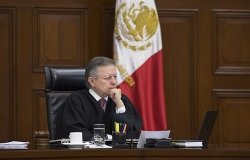#225 Presidentialism in Brazil: The Impact of Strong Constitutional Powers, Weak Partisan Powers, and Robust Federalism
By Scott Mainwaring
From the Preface
This working paper represents part of the research of Scott Mainwaring, professor of political science at the University of Notre Dame, while a Fellow at the Woodrow Wilson Center in 1995-1996. Each year, the Wilson Center hosts prominent scholars from around the world, providing them with support for their research and enabling them to share their results with a wider audience.
Scott Mainwaring's research was presented formally at a seminar hosted by the Latin American Program on February 14, 1996, entitled "Presidentialism, the Party System and Democratic Governance in Brazil." Commenting on his work was Riordan Roett, the Director of the Latin American Studies Program at the Johns Hopkins School of Advanced International Studies and an internationally renowned expert on Brazil.
In this paper, Mainwaring describes the nature of Brazil's presidential system and historical trends in the president's relationship with congress. In his analysis of the patterns of interaction between the legislative and executive branches and developments in the political party system, Mainwaring identifies three main characteristics of the Brazilian political system: fragmentation, wide presidential powers, and strong federalism. Mainwaring examines how these tendencies have affected the power and agenda of each presidential administration since the 1940s. The democratic period since 1985 receives special attention, with particular emphasis on the impact of the 1988 constitution, the complicated dynamics behind Collor's truncated presidency, and Cardoso's relative success with recent reforms. Mainwaring argues that Cardoso's ability to work measures through congress benefitted in 1995 and 1996 from a consensus that change was necessary to front a growing crisis. However, significant constitutional reform of the political system is necessary before such presidential effectiveness can be consolidated.
Related Program

Latin America Program
The Wilson Center’s prestigious Latin America Program provides non-partisan expertise to a broad community of decision makers in the United States and Latin America on critical policy issues facing the Hemisphere. The Program provides insightful and actionable research for policymakers, private sector leaders, journalists, and public intellectuals in the United States and Latin America. To bridge the gap between scholarship and policy action, it fosters new inquiry, sponsors high-level public and private meetings among multiple stakeholders, and explores policy options to improve outcomes for citizens throughout the Americas. Drawing on the Wilson Center’s strength as the nation’s key non-partisan policy forum, the Program serves as a trusted source of analysis and a vital point of contact between the worlds of scholarship and action. Read more









